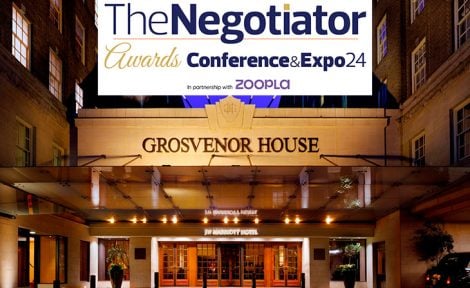INTERVIEW: The Negotiator Awards judges reveal the secrets to standing out
Storytelling and strategy is what we’re looking for. The Judges tell Charlotte Flake what impresses and what disappoints when it comes to submissions for The Negotiator Awards (closing date 14th September).
 As entry season for The Negotiator Awards heats up, (deadline 14th September), so does the behind-the-scenes work of those tasked with the all-important role of selecting this year’s potential winners. But what are the judges really looking for? What separates a “good” entry from a great one – and what’s guaranteed to send a submission straight to the bottom of the pile?
As entry season for The Negotiator Awards heats up, (deadline 14th September), so does the behind-the-scenes work of those tasked with the all-important role of selecting this year’s potential winners. But what are the judges really looking for? What separates a “good” entry from a great one – and what’s guaranteed to send a submission straight to the bottom of the pile?
To lift the lid on the judging process, we spoke exclusively to six experienced panel members about what impresses them, what turns them off, and why these awards still matter more than ever.
The industry’s best in the spotlight
Every judge brings decades of experience to the role, as well as deep knowledge of both the front-line pressures and the evolving standards that define the property industry today.

Valerie Bannister, who was awarded The Negotiator’s 2024 Lifetime Achievement Award and has judged the competition for several years, puts it simply:
“It is very important to inspire young people to join this industry and see that they can have a career path. It means a lot to every category winner, and they in turn promote this in their local communities.”
Others echo the same sentiment. Former ARLA President Greg Tsuman, now MD of Lettings at Martyn Gerrard Estate Agents, says:
“Awards like The Negotiator Awards set a benchmark for professionalism and service… For many teams, being shortlisted or winning is not just a morale boost, it’s a powerful endorsement that strengthens client trust.”
For Angharad Trueman, Group Lettings Director at Andrews Property Group and recent ARLA President, it’s also about industry pride: “The whole industry often gets a bad press, which is a shame as there is so much good out there.
“It’s really important to shine a light on all of this great stuff and celebrate the forward thinking, passionate, customer driven businesses that operate in the industry. It makes us all want to up our game and be the best we possibly can be.”
These awards can really shine a light on the great work.”

Mairéad Carroll, Senior Specialist in the Professional Practice team at RICS, agrees: “We tend to focus on the things that go wrong, however, it is great to have an opportunity to focus on the good – so many agents are making a hugely positive contribution to their local communities and these awards can really shine a light on the great work that they do.”
Success stories – literally
Ask the judges what stands out, and one answer comes up again and again: storytelling. As Trueman puts it: “Those are the ones you end up rooting for on the night.”
“Taking the judge on a journey is an interesting way to learn what incentivises an individual to go from start up in their front room to acquiring an office and taking on staff,” says Bannister.

“Definitely storytelling. Definitely innovation,” agrees long-time judge and customer service trainer Clare Yates. “Data is good to add credibility, but ultimately it’s the stories of what they’ve achieved, how they’ve achieved it, and what it means to them that makes it a great entry.”
“The judges won’t know your business, so you need to both show and tell us what you have achieved,” explains Carroll. “Testimonials can be really powerful as well.”
That storytelling, however, needs to be backed up. Judges aren’t just looking for polished language – they’re looking for proof.

“Be detailed but concise and sell your entry as if you were selling your company,” adds Toby Leek, Associate to the Royal Institution of Chartered Surveyors and immediate Past President of NAEA Propertymark.
“Then back this up with examples of scenarios placed within a storyline of the business that incorporates every element of it. Be succinct, clear and precise.”
“A truly standout entry combines all three: it tells a compelling story, includes strong evidence, and showcases innovation,” confirms Tsuman.
In other words, entries should read more like a smart, substantiated business case than a marketing flyer that goes beyond the hype.
How entries are judged: rigour, research and red pens
There’s a myth that judging awards is a quick flick-through job. In reality, it’s a detailed, evidence-driven exercise with research outside the submission playing a big role.
Leek describes his meticulous multi-pass and scoring system, which includes initial notes, company research, and rankings – and returning for another review a few days later.
Others take similarly thorough approaches with social media, websites, and even Google reviews cross-referenced for authenticity.
I check out their website and reviews before I even start to look at the entry.”
“I check out their website and reviews before I even start to look at the entry,” says Yates. “I also look at Facebook and other social media to see what they write and how they interact with their audience.”
Bannister describes her method as “old school” – grids, cross-checks, word counts – but insists it’s about fairness: “I always go the extra mile if information is missing, just so I can see more info about a submission.”
One red flag? Copy-and-paste jobs or recycled entries.
“I have the memory of an elephant!” she adds. “If the submission looks identical to a previous year with just a few tweaks – that’s a huge disappointment.”

“I’ve seen the same submission used from the previous year just changing the figures,” says Trueman.
“Rushing your entries, copy and pasting across multiple entries and getting complacent because you might have won the award previously – I’ve seen all of this.”
Quality on the rise – and the AI elephant in the room
Over the years, judges say entry standards have improved significantly. The difference is particularly striking in the level of creativity and presentation.
“Entries have become more polished… Agencies are also becoming more creative in how they present their unique value. Some are even using videos or well-designed visuals to make an impression,” says Tsuman.
“It used to be that someone would just submit a few lines of text,” adds Trueman. “Now most entries use the full 500 words, attach photos, marketing campaigns – the bar is really high now.”
That polish, however, can sometimes cross into territory that raises suspicion: AI.
Several judges admit they can now spot AI-generated entries and have mixed feelings about it.
“It’s easy to spot an entry that sounds like they’re talking about another business altogether, using terms and phrases that are out of this world!” says Yates. “But I don’t mind it as long as it matches their normal marketing messages.”
I’m not opposed to using it to polish your entry… but it shouldn’t be your whole submission.”
“Everyone can spot ChatGPT language a mile off,” claims Trueman. “I’m not opposed to using it to polish your entry… but it shouldn’t be your whole submission.”
Bannister is more forthright: “I believe there should be an AI disclosure. Some websites do have AI generated images which I think is misleading to the public, never mind when you are trying to judge an entry!
“I applaud the entries who submit actual photographs of their blocks or their individual properties, depending on what category they are in. I try to be on the lookout for an AI generated entry as the natural empathy and staff investment otherwise can be lost.”
Leek believes it’s all about balance though – incorporating AI effectively whilst also showing off real passion in a submission.
Common pitfalls and top tips
Among the biggest “don’ts” is over-claiming, especially without any evidence.
“Arrogance, bragging or boasting without any evidence and assuming the judge won’t look at reviews or social media is just stupid,” says Yates.
Of course, the criteria is absolutely key too.

For Tsuman, vague, buzzword-heavy entries are a missed opportunity: “Some fail to address the criteria or rely too heavily on generic language. Submissions should be authentic, focused and substantiated. Otherwise they risk getting lost in the shuffle.”
Carroll adds: “One of the things to really consider when sending in a submission is that judges score against the criteria that have been set. If the criteria haven’t been covered, then we can’t score.”
So how do you make an entry shine?
“Tell me what you are truly passionate about,” says Tsuman. “Bring your achievements to life with real examples, measurable results, and a sense of purpose.”
“Make it easy and entertaining to read,” comments Yates. “Make it about people as well as business.”
“Use evidence to back up what you are saying… and make sure your website reflects what you’re putting in the entry,” adds Trueman.
A well-structured one-page supporting document can tell me more than a lengthy submission filled with jargon.”
Less is also sometimes more, says Tsuman: “A well-structured one-page supporting document can tell me more than a lengthy submission filled with jargon.”
If in any doubt about the quality of your submission, Leek recommends seeking an outside perspective: “Take time with your entry and ensure there aren’t any errors. It’s worth getting people to review the entry from both inside and outside the industry to gain a broader scope of feedback before submitting.”
But if there’s one universal takeaway from every judge we spoke to, it’s this: be authentic.
Why it’s all worth it
Beyond the glittering ceremony and the trophies, the judges all agree that awards like these matter – not just to the winners, but to the entire industry.
“It gives back to hard-working agents who want to showcase their experience,” says Leek and “creates a space to celebrate best practice and elevate the reputation of the industry,” says Tsuman.
From a judging perspective, it’s the variety they enjoy the most.
Carroll comments: “I really enjoy seeing the mix of applicants. From the larger firms to the smaller independent businesses.”
“I enjoy seeing first-hand the very entrepreneurial agents we have in the industry and how they adapt to constant changes in the property sector,” adds Bannister.
For Yates, it’s about seeing individual creativity in entries, and for Trueman? “I always finish judging feeling really proud of our industry and all the fantastic businesses in it.”
Entries for The Negotiator Awards 2025 are open until midnight 14th September – get yours in now!










